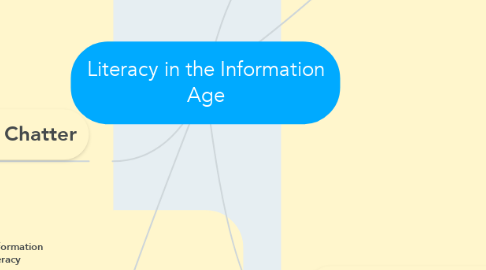
1. iSkills Test
1.1. attempt to assess information literacy/computer literacy
1.2. linked with partnership of 21st century skills
1.3. proscribes a method for searching, labelling, organizing, etc
1.4. concerns
1.4.1. are they too restrictive in how they define good search and good labeling?
1.4.2. students searching for predetermined right answers in a world with millions of paths
1.4.3. can this be a formative, not a summative assessment?
1.5. stuff we liked
1.5.1. at least they are trying to assess a skill which we agree is important, whatver their failings
1.5.2. scenario based, so more realistic and "real world"
1.5.3. involves writing, not just multiple choice
2. Coding Chatter
2.1. do we have to know how to code? to what extent?
2.1.1. potentially, it's "too specialized"
2.1.2. yes, because why should we trust templates
2.1.3. is there a middle ground somewhere?
2.1.4. can we learn the vocabulary of code without become code wizards?
2.1.5. we say it's important for kids, but we don't know it ourselves?
2.1.6. those in the field of computer writing in its early days were programmers
2.1.7. yes, because Microsoft code is crap
2.1.8. maybe we should at least learn code to the extent of understanding metadata
2.1.9. returns to Selber's idea of wanting learners to be builders, not just consumers
2.1.10. Danielle Harlowe working on a number of projects in the realm of youth coding initiatives
2.2. is writing code "composition"? how or how not?
3. Zach's Presentation on Backwards Design (this is better explored through our created group document).
3.1. Attached here - the accompanying Prezi
4. Deadlines/Logistics
4.1. presentations next week
4.1.1. bring treats
4.1.2. informal casual, if you want it to be
4.2. finals week
4.2.1. Karen won't be around, make office hours happen
4.2.2. portfolio review, should begin with a cover letter that details where to find what and gives a brief description of work throughout the class
5. Podcasts Discussion
5.1. what do we call the article we read in a formal context? is it still an article? Is a transcript of a podcast an article?
5.2. what are the affordances of podcasts? what affordances do they remove?
5.2.1. many don't like listening
5.2.2. listen while doing other things = popular
5.2.3. levels of meaning from intonation vs. speed of reading
5.2.3.1. on topic of speed, see spreeder or spritz
5.2.4. portability
5.2.5. video podcasts
5.2.6. heightened imagination while listening than with reading?
5.2.6.1. this perhaps has some of the magic of traditional, oral storytelling
5.3. other issues
5.3.1. to what extent is podcast creation composition?
5.3.2. what do we think of the author's attempt to like podcasts to Aristotle's canons of rhetoric?
5.3.3. Karen's new class will discuss podcasts in the context of science writing for the public
5.3.4. should we give students what they want? all lectures on video, with table of contents?

